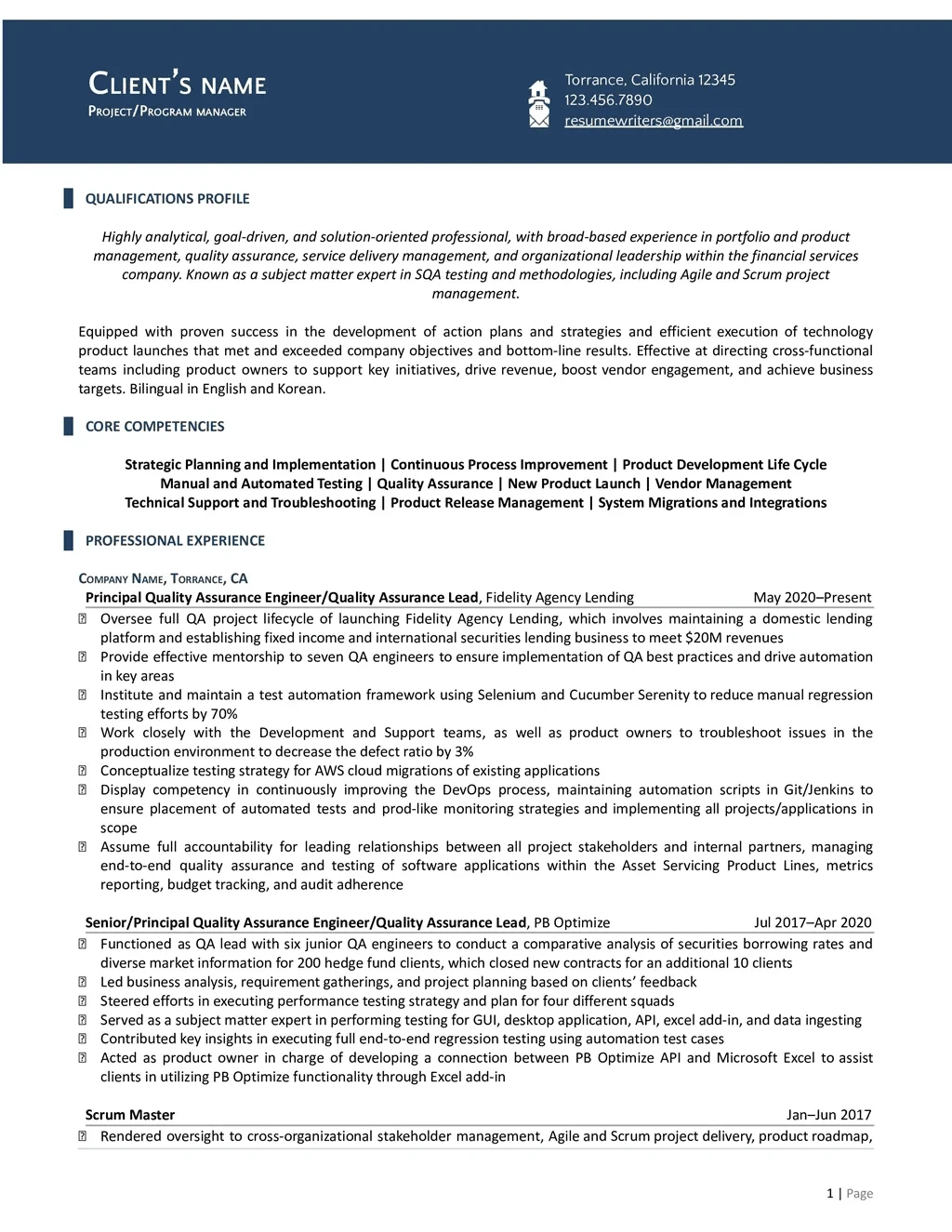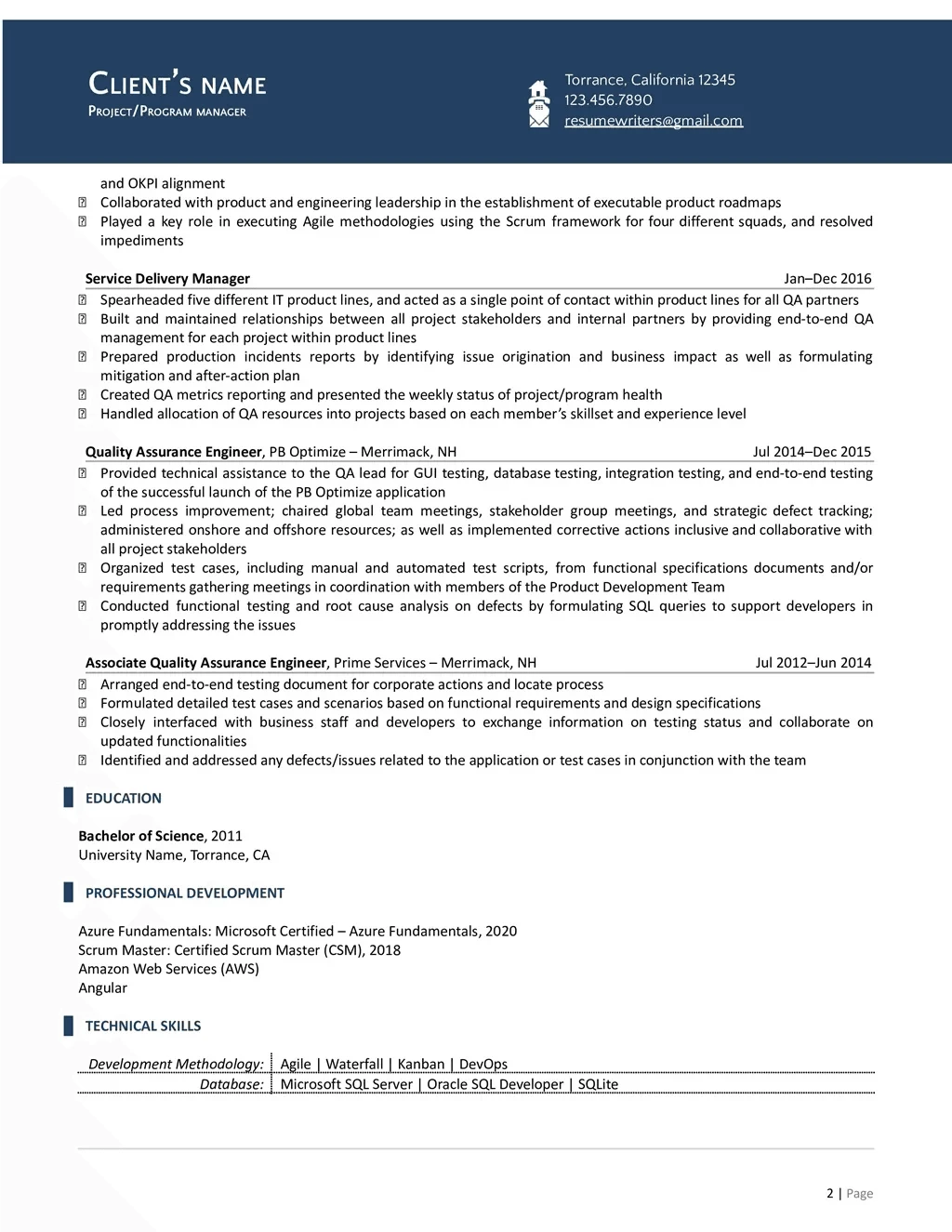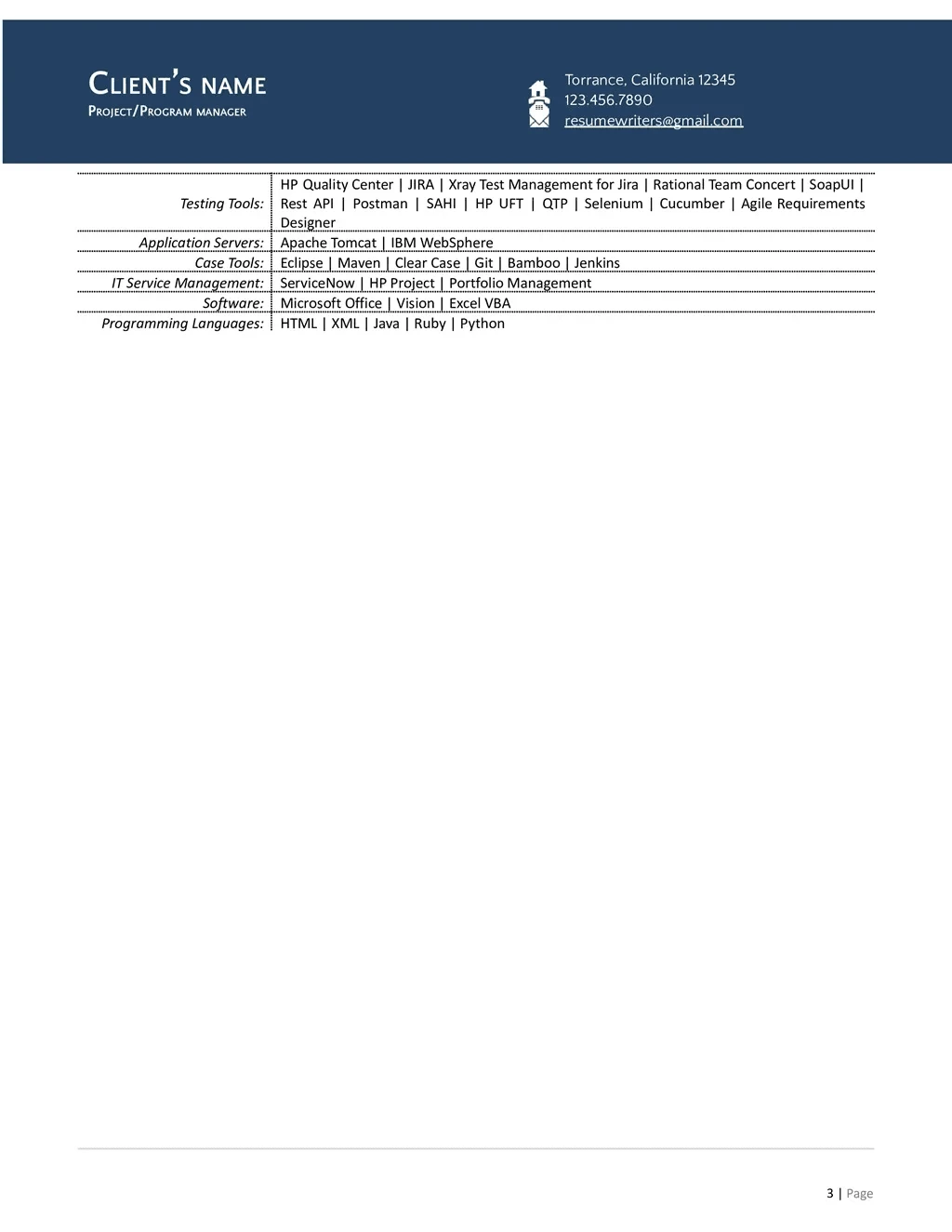As industries expand and technology advances, the demand for skilled project managers grows. In fact, according to the Bureau of Labor Statistics, there is an expected uptick in job vacancies for project management specialists per year leading into the next decade, with 68,100. Additionally, the position pays a competitive base salary of $73,495 as recorded by Payscale, which draws an increasing number of job applications.
Are you considering a career in this field? If so, read on as we discuss the essential roles of project managers and how to become one. Furthermore, we’ll share key insights and show you a job-winning project manager resume example to help you create your own. Keep reading.
What is a Project Manager?
A project manager (PM) is responsible for the successful implementation of projects within a company. Whether in marketing, IT, or construction, project managers supervise every facet of a project from inception to conclusion, guaranteeing compliance with organizational objectives and the stakeholders’ satisfaction.
Project managers do more than just oversee; they also serve as integral liaisons between teams in times of crisis or poor communication. They anticipate risks, address them head-on, and skillfully navigate roadblocks to keep projects on track.
As their careers progress, PMs may also be in charge of recruiting, onboarding, and training new staff members. Additionally, they might end up assuming higher-level positions such as C-suite executives, program directors, or senior managers.

What are the Duties of a Project Manager?
Project managers supervise a diverse range of projects across several industries. However, as the projects they work on become more varied, so do their duties. Nonetheless, project managers’ broad responsibilities are most frequently shared by the following:
- Create detailed project plans in outlining objectives, milestones, and timelines.
- Build and lead cross-functional teams, while fostering collaboration and ensuring clarity in roles and responsibilities.
- Identify potential risks and develop strategies to mitigate issues and secure overall project success.
- Closely monitor project expenditures, budgets, and resource utilization to maximize efficiency and ensure smooth project execution.
- Consistently uphold quality standards throughout the project life cycle by conducting inspections and implementing corrective measures as needed.
- Ensure open and transparent communication with clients and stakeholders.
- Provide updates, respond to inquiries, and use feedback to adjust project scope to meet or exceed client expectations.
- Keep accurate and comprehensive records of project activities, decisions, and outcomes for accountability and future reference.
- Implement quality management systems and conduct regular audits to assess compliance.
- Drive continuous improvement by identifying opportunities to streamline processes, enhance efficiency, and optimize project performance.

How Do You Become a Project Manager?
With the wide range of responsibilities that come with being a project manager, aspiring individual should properly prepare themselves for success in this fast-paced industry. You need to make sure that you have all the skills applicable in this role. And to do that, here are some steps you could take to become a project manager:
Pursue a relevant degree.
Obtained a degree in an area of study like computer technology, engineering, project management, or business administration. In the job market, having a relevant degree makes you more credible and competitive. Employers will see that you have a firm grasp of project management concepts and procedures, which will better prepare you to take on the demands of the position.
Acquire hands-on experience.
Aside from obtaining a degree, seek hands-on experience in project management through internships, entry-level roles, or volunteer work. These exposures allow you to apply theoretical knowledge in real-world scenarios and gain insights into how projects are managed in different industries and contexts, making you a more attractive candidate.
Take additional licenses and certifications.
If you’re hoping to work as a project manager at a higher level, you might want to get certified as a Project Management Professional (PMP). Possessing this kind of certification means that you have passed an extensive training course and test, which can add to your qualifications and distinguish you further from other applicants.
Focus on improving management skills.
Project managers often oversee teams which is why it is also important that you enhance your management skills. Honing these abilities will help you become better equipped to handle the various aspects of project management.
What to Include in Your Project Manager Resume
A job as a project manager is both exciting and challenging. It requires a diverse skill set to handle the difficulties of directing projects from start to finish in which you must demonstrate to hiring managers if you want this role. You also need to establish your suitability for the position, which you can only achieve by crafting a compelling resume. To do this, here are some of the key information you should include in your project manager resume:
Contact Information
Begin your project manager resume with detailed contact information. Include your full name, current address, phone number, and email, as well as links to your LinkedIn and professional websites. This not only ensures seamless communication; it also increases your visibility and accessibility, which may lead to more prospects.
Target Job or Career Tag
After providing your contact details, mention to potential employers the kind of project management role you are looking for. This ensures that recruiters will match you with opportunities that align closely with your career goals and expertise.
Qualifications Profile
Resume summary or qualification profile is the portion of your resume that is vital, as it is frequently the first spot hiring managers look for. So, make sure to highlight your key abilities, extensive experience, notable accomplishments, and other pertinent details to capture their attention and increase your chances of getting noticed among the competition.
Expert Tip:
Avoid including resume objectives and instead create headings and resume titles that can swiftly capture the attention of hiring managers. Doing this might significantly increase the chances of your resume standing out.
Areas of Expertise
Hiring managers frequently use this section to quickly review your skill set. Therefore, ensure that your expertise and areas of strength in project management are represented in this part. Employ a balanced blend of soft and hard skills in your project manager resume, showcasing your knowledge and work methodologies to recruiters and hiring managers.
Professional Experience
Hiring managers will likely focus most of their attention on the work experience section, so make the most of it. Include the names of your employers, both past and present, the locations where you worked, and the inclusive dates of your tenures. Enumerate your daily responsibilities and showcase accomplishments for each job in bullet points as much as possible.
Education
Incorporate your educational background, including the institution, degree obtained, and graduation year, alongside any academic distinctions or accomplishments relevant to project management. Most employers consider academic background in making hiring decisions, so make sure to highlight this information to recruiters.
Professional Development
Highlight your commitment to professional growth by including relevant training, certifications, and licenses in your project manager resume. This section underscores your dedication to enhancing your skill set.
Add Other Applicable Sections to Your Project Manager Resume
Lastly, strengthen your project manager resume with sections such as affiliations, extracurricular activities, technical talents, and important projects. These additions can provide further insight into your qualifications and may set you apart from other applicants.

How to Write Your Project Manager Resume
When writing a project manager resume, it’s not enough to just know its key components; you also need to know how to highlight your strengths. So, to help you demonstrate to the hiring manager that you are a worthy candidate, here’s a step-by-step guide that you may follow to format an effective project manager resume.
1. Customize your resume for each job application.
Tailor the content of your resume to the specific requirements of the position you’re applying for. Directly addressing the criteria of the role, may boost your chances of being seen by recruiters and hiring managers as it helps in demonstrating your suitability and genuine interest for the role.
Expert Tip:
Examine the job posting carefully and gather the keywords you’ll need for your resume before you begin writing it. These days, hiring managers typically utilize an applicant tracking system, so adding industry keywords to your resume might help you pass it.
2. Quantify and showcase your work impact and contributions.
Instead of just listing your duties, provide concrete numbers or measurable results to demonstrate your achievements in previous roles. This may help make your accomplishments more compelling and credible, giving potential employers a clear understanding of your value and potential contributions to their organization.
3. Emphasize your management and leadership abilities.
Highlight experiences where you’ve successfully led teams, managed projects, or demonstrated strong leadership capabilities. These top skills are highly valued by employers and showcasing this on your resume may help you in position yourself as a applicant capable of taking on higher-level responsibilities and leading others effectively.
4. Keep your resume concise and focused.
These days, hiring managers spend barely 7 seconds looking over resumes. Thus, it is not a good idea to have an overly lengthy resume. So, present only information that demonstrates your suitability for the job. This can help recruiters and hiring managers quickly identify your essential strengths and experiences, boosting the probability that you’ll be considered a great candidate for the role.
5. Thoroughly review your resume for grammatical errors.
After you’ve finished writing your resume, proofread it for grammatical problems, typos, and inconsistencies with resume formatting to ensure it looks polished and professional. This will help you avoid embarrassing mistakes that could jeopardize your credibility as a job aspirant. Furthermore, this could help you present yourself as detail-oriented and meticulous, both of which are attributes that companies look for in project managers.
Project Manager Resume Example
Now that you understand the important processes in developing an application tool, let us see these resume writing methods in action. Here’s a project manager resume example that shows how these strategies and components work together seamlessly. Use this as a guide in creating your own version.



Download a copy of this project manager resume example.
Take Charge of Your Career Journey with Our Expert Project Manager Resume Services!
The role of a project manager is not simply to supervise projects; it’s also about guiding them toward success despite numerous challenges and uncertainties. By acquiring the necessary skills, experience, and crafting a strong resume, you can establish yourself as a formidable presence in the field of project management.
Unable to create your own resume from our project manager resume example? Then it’s time to seek assistance from an expert. Resume Professional Writers provides top-notch resume writing services and boasts of a team of skilled writers who can assist you in crafting the perfect resume to pave the way for your future as a project manager.
So don’t hesitate; contact us now and kickstart your career in project management!






